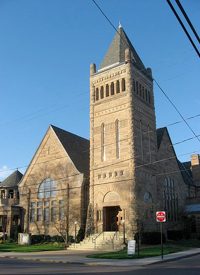
In the lawsuit, Sean Coppedge, whose parents were Presbyterian missionaries in what is now the Democratic Republic of the Congo, charges that although those operating the boarding house in Kinshasa were aware of allegations that the son of a Presbyterian missionary couple had sexually abused another boy at the facility, he was allowed to return to the house, where he later abused Coppedge as well.
The lawsuit, which was filed in Louisville, Kentucky, where the PC-USA is headquartered, states that the denomination had received reports before 1988 of alleged abuse at the facility and that it “knew or should have known … that its mission children were vulnerable to sexual abuse.” Coppedge is seeking damages for emotional distress, lost wages, the cost of counseling, and other injuries.
The charge by Coppedge is one of many detailed in a 546-page report that represents the findings of an independent panel commissioned by the church. The panel, which spent several years investigating charges of physical and sexual abuse involving the children of missionaries serving overseas from the 1950s to 1990, ultimately named nine individuals, including ministers ordained with the denomination, whom the panel determined had abused children.
A similar investigation in 2002 had found “overwhelming” evidence that a Presbyterian minister and missionary had sexually abused at least 22 girls and women over a 40-year period, both in Africa and the United States, and, additionally, that between 1968 and 1970 a male Methodist missionary had abused children of Presbyterian missionaries at the same Kinshasa facility where Coppedge says he was abused.
In all, the most recent investigative panel looked into 85 allegations, concluding that 30 confirmed instances of physical and sexual abuse had occurred at PC-USA missions localities in Cameroon, Congo, Egypt, Ethiopia, India, Mexico, Pakistan, and Thailand. The panel concluded that scores of other allegations lacked enough evidence and information to substantiate.
According to the report, many of the alleged abusers of the children were teachers, house parents, and peers, and many of the instances of abuse occurred at schools and boarding facilities where children were supposed to be safe and protected. “Children in boarding school felt vulnerable,” the report related. “Was it the separation from their parents with whom they might have communicated their fears? Was it the code of silence through censorship of letters home or implicit messages to not worry busy parents? Was it the loneliness and abandonment they felt? Or was it feeling they must be bad?”
Victims interviewed by the panel told of the impact the abuse had on their lives, citing ongoing guilt and shame over the incidents, as well as depression and difficulties in maintaining relationships. “To this day I do not fully understand why I did not cry out as he attempted to rape me,” one victim told the panel as she recalled her own abuse nightmare, “why I wanted this crisis solved without others knowing.”
Linda Valentine, executive director of the denomination’s General Assembly Missions Council (GAMC), noted that over the 40 years that the abuse occurred, thousands of children accompanied their missionary parents to far-off places, where some of those children “were abused and traumatized,” and where “the church did not protect these vulnerable people…. On behalf of the church, I grieve with those who suffered and who continue to suffer because of this abuse. I hope that they will receive some comfort in knowing that the church has already implemented many procedures to prevent such abuse in the future, and will continue to develop and refine procedures so that no child is placed at risk again.”
The PC-USA, which boasts some 2.2 million members and an estimated 10,000 congregations across the nation, is one of a handful of mainline Christian denominations that has witnessed the liberalization of its doctrines and accepted behaviors over the past several years. In July 2010, delegates to the denomination’s General Assembly meeting in Minneapolis voted to allow the ordination of non-celibate homosexuals, while temporarily shelving a proposal to expand a church-wide definition of marriage to include homosexual couples, a move that would allow clergy to “marry” same-sex partners.



